

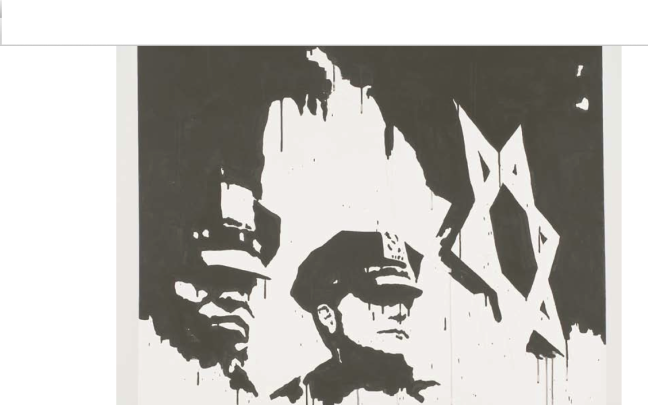



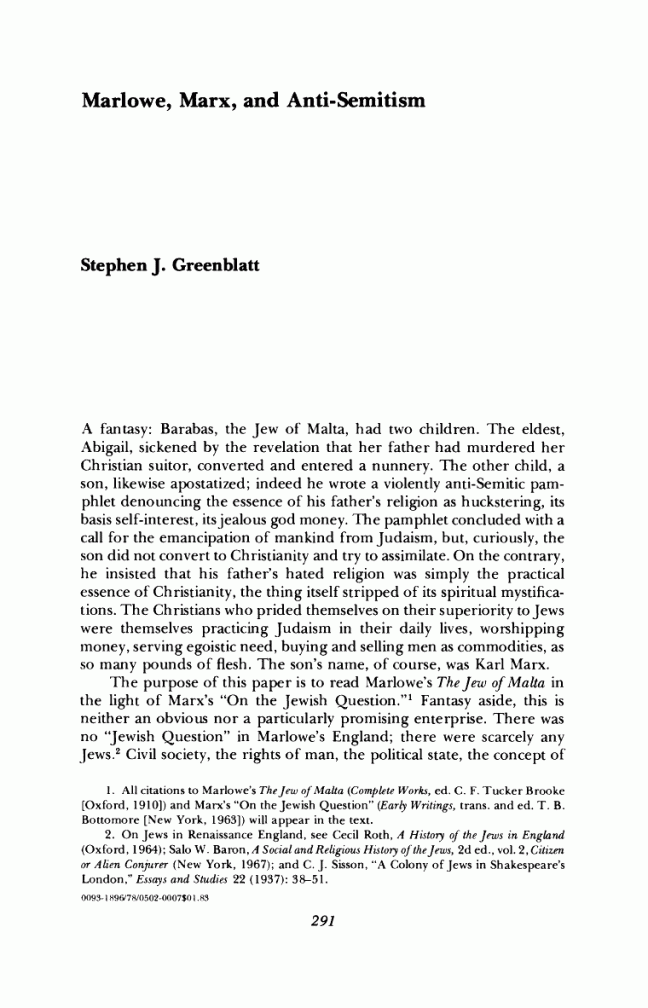
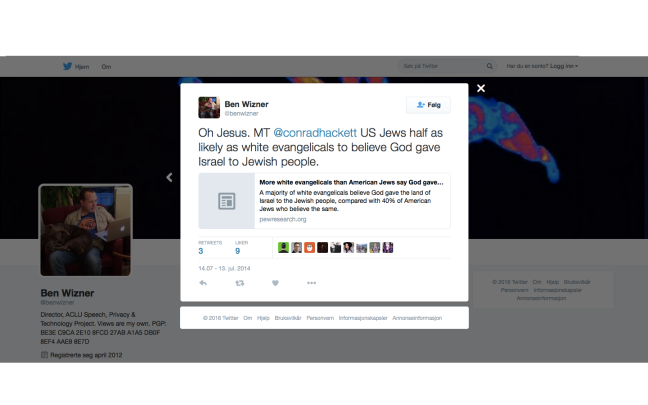
In his novel Reader’s Block from 1996 David Markson shuffles together bits of pieces of fun facts, sad facts and other information about authors, artists and philosophers and combine this with quotes from the same range of sources. One of the repeated motives is anti-semitism in sentences which goes like «he-and-she was an anti-semite». These are never explained more, so I will collect some more information about the background of these people’s opinions.
»Ezra Pound was an anti-Semite.«
»All the Jew part of the Bible is black evil, an Ezra nicety.« Quotes -David Markson
The Jewish poet Louis Zukofsky had something to say about this:
»Through a series of biblical and contemporary allusions, “Nor Did the Prophet” addresses Zukofsky’s relationship with his mentor Ezra Pound and attempts to come to terms with Pound’s antisemitism by reconsidering the rhetoric of Pound’s controversial Pisan Cantos.« (From https://muse.jhu.edu/article/31599)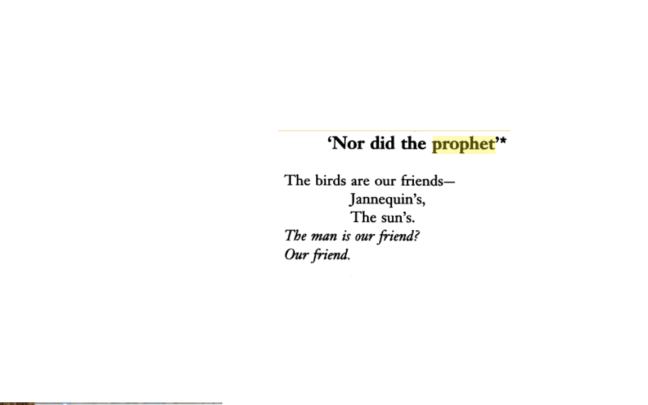
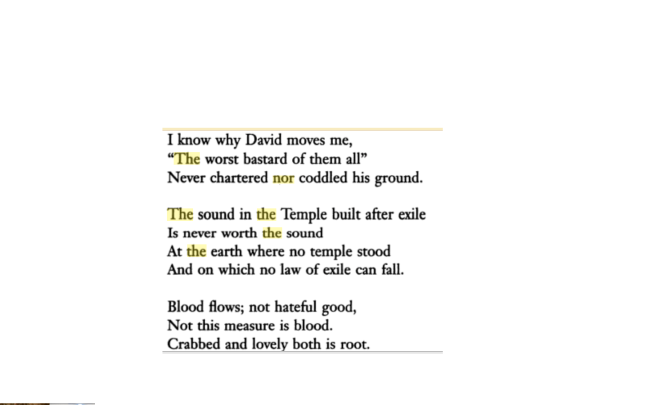
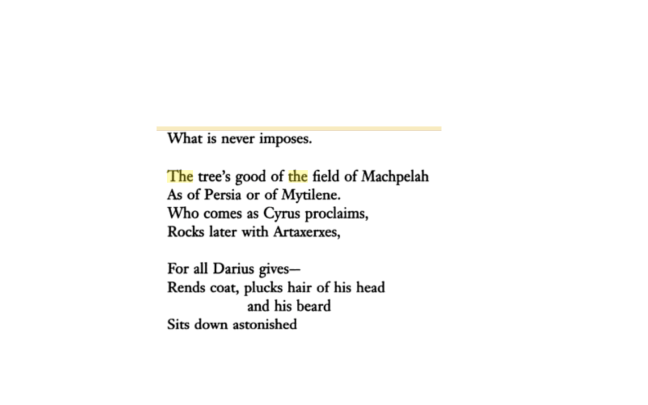
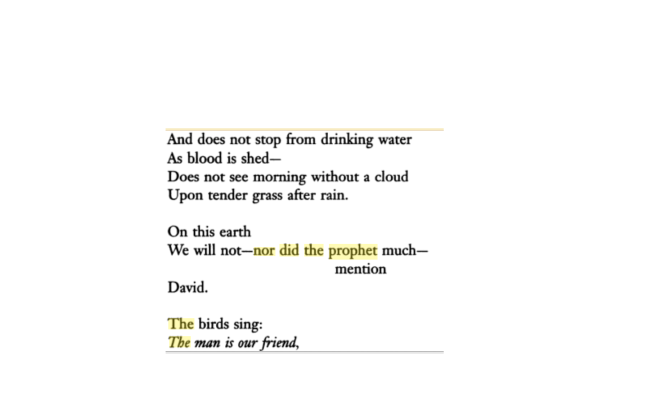
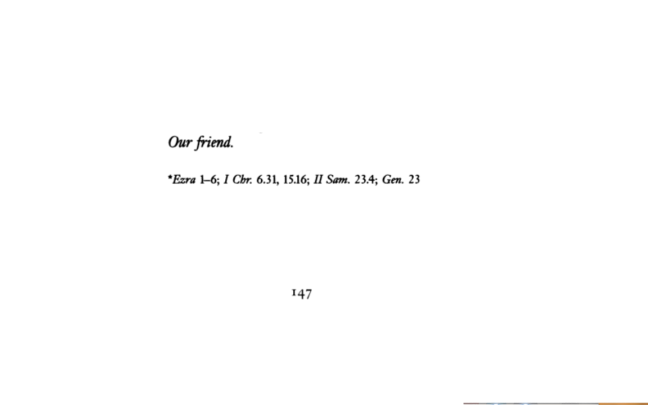 Screen dumps from the book Anew: Complete Shorter Poetry By Louis Zukofsky (Source: http://bit.ly/1s3mUZW)
Screen dumps from the book Anew: Complete Shorter Poetry By Louis Zukofsky (Source: http://bit.ly/1s3mUZW)
In his novel Reader’s Block from 1996 David Markson shuffles together bits of pieces of fun facts, sad facts and other information about authors, artists and philosophers and combine this with quotes from the same range of sources. One of the repeated motives is anti-semitism in sentences which goes like «he-and-she was an anti-semite». These are never explained more, so I will collect some more information about the background of these people’s opinions.
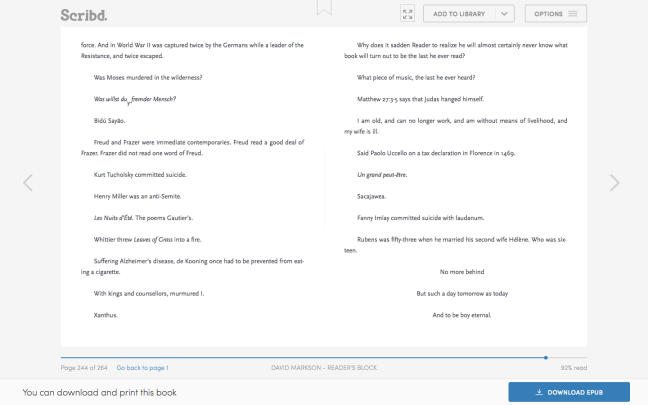
«As the Brooklyn-born son of first-generation German-American Catholics, Miller grew up in a time and place where resentment of the Jews who were overrunning the borough was typical if not ubiquitous. In his career as a writer and in his letters to friends and colleagues, Miller committed to paper plenty of awful anti-Semitic slurs. But he also doted on his Jewish wife (whom he referred to, at times, as “the Jewish cunt”), had dozens of Jewish friends (some of whom he loathed), fantasized about having unknown Jewish ancestors, and adored Yiddish literature—not only the lionized Isaac Bashevis Singer but also figures much less widely known in English, like the humorist Moyshe Nadir.» (From Tablet Magazine)
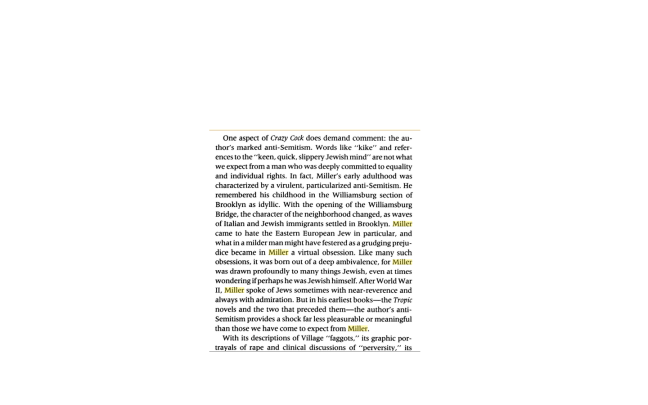
From 10:51 on: Ariel Pink: “…race, not a religion, that means like..I’m from the tribe of Abraham. It means I can’t deny my judaism, based on their rules, like I can’t say ‘I’m not jew’. But the fact is I’m not of the bloodline.”
Interviewer: “You didn’t choose to be chosen.”
Ariel Pink: “I was mistakingly chosen, and now they’re just like ‘You’re jewish, come on!’ They just wanna, like cover it up. But that’s the kind of jews we have now a days, so fly-by-night jews. And I take religion very seriously, I actually do! I really really really respect it, but I think that all jews should be at the wall and pray now, not being rock stars.”
“I hereby acknowledge the remarkable rise of Jews inside the U.S. establishment in the last generation. Let’s just look in my field of law. Three Jews sit on the Supreme Court. A Bush Administration attorney general was an Orthodox Jew, and another Jew ran the Bush OLC. Jews are around 25% of all law professors, and are among the most influential professors on the far left (e.g., Brian Leiter), liberal left (e.g., Cass Sunstein), and libertarian right (e.g., Richard Epstein). Some of the most influential lower court judges, including the liberal Stephen Reinhardt, the conservative libertarian Alex Kozinski, and the eclectic Richard Posner are Jews. And of course most of the contributors to the leading law professors’ legal blog are Jews. Jews are doing very well in the United States. Yay! Good for American Jews, and good for America.
But my post wasn’t about denying that Jews have joined and thrived in the American establishment (heck, even the founder of a leading American anti-Jewish hate site is a Jew).” (http://wapo.st/1HLXIYW)
“Mondoweiss is an independent website devoted to informing readers about developments in Israel/Palestine and related US foreign policy. We provide news and analysis unavailable through the mainstream media regarding the struggle for Palestinian human rights. Founded in 2006 as a personal blog of journalist Philip Weiss, Mondoweiss grew inside the progressive Jewish community and has become a critical resource for the movement for justice for Palestinians.” (http://bit.ly/1MDkqKY)
“Philip Weiss is an American journalist who co-edits Mondoweiss (“a news website devoted to covering American foreign policy in the Middle East, chiefly from a progressive Jewish perspective”[3]) with journalist Adam Horowitz.[3][4] Weiss describes himself as an anti-Zionist and rejects the label “post-Zionist.”[5]
“It’s normal for members of a community – imagined or not – to attend to the facts and stories of their daily lives and the lives of people who are like them. The broadening and fragmentation of the media landscape enables and encourages the phenomenon. Sites like this one even help drive the development of new communities.
Yet, one consistent and durable criticism of the Jewish-Israeli left goes to its bewilderingly myopic perspective. It’s not so much an inability to see other people. Rather, it’s the tendency to see others as objects (or rarely, agents), situated within a narrative of self. A preening egoism adorns every “humane” pronouncement about the need to end the occupation. Don’t you see? Apartheid undermines the very essence of our whatever and etc…
Fine, one group of people is painfully self-involved and grandiose. Why is that important?
In other circumstances it wouldn’t matter: like a whole culture dedicated to bathroom selfies. But in the apartheid context it matters a lot. The dehumanization of other people occurs through the extraordinary status we afford ourselves or through the denigration of others. For the Jewish-Israeli left it’s the former, for the right it’s both.”(http://bit.ly/1VxY2G6)
Yusef Komunyakaa, “Envoy to Palestine” from The Emperor of Water Clocks. Copyright © 2015 by Yusef Komunyakaa. Reprinted by permission of Farrar, Straus and Giroux.
Weiner: “The picture-frame convention was a very real thing. The painting stopped at the edge. When you are dealing with language, there is no edge that the picture drops over or drops of. You are dealing with something completely infinite. Language, because it is the most non-objective thing we have ever developed in this world, never stops”.
